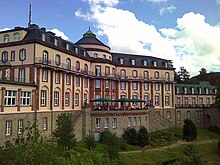Language speaks

"Language speaks" (in the original German Die Sprache spricht) is a saying by Martin Heidegger. Heidegger first formulated it in his 1950 lecture "Language" (Die Sprache),[1] and frequently repeated it in later works.[2]
Adorno expressed a related idea when he said that language "acquires a voice" and "speaks itself."[3]
The "Language" lecture
The saying was first formulated by Heidegger in the lecture "Language" ("Die Sprache") in memory of Max Kommerell, first delivered on October 7, 1950 at the Bühlerhöhe building.[4] The lecture was translated in English by Albert Hofstadter in the 1971 Heidegger collection Poetry, Language, Thought.[5]
Quoting Johann Georg Hamann's 1784 letter to Johann Gottfried Herder, Heidegger talks of language as an "abyss."
See also
Notes
- ^ Lyon (2006) pp.128-9
- ^ Philipse (1998) p.205
- ^ Carsten Strathausen (2003) The look of things: poetry and vision around 1900, Volume 8, Issue 126, p.148-51
- ^ Heidegger (1959) Unterwegs zur Sprache, references section, p.259, quote:
translation by Albert Hofstadter in Heidegger (1971), p.xxv, quote:Vortrag vom 7. Oktober 1950 auf Bühlerhöhe zum Gedächtnis von Max Kommerell und am 14. Februar 1951 bei der Württembergischen Bibliotheksgesellschaft in Stuttgart wiederholt.
"Language"
"Die Sprache," in Unterwegs zur Sprache (Pfullingen: Neske, 1959). In this volume's references Heidegger writes: "The lecture was given on October 7, 1950, at Bühlerhöhe in memory of Max Kommerell and was repeated on February 14, 1951, at the Württembergischen Bibliotheksgesellschaft in Stuggart. The lecture, hitherto unpublished, has become known in the form of many transcripts and notes." - ^ "Language", in Heidegger (1971) pp.187-ff
References
- Heidegger (1950) "Die Sprache", first published in Heidegger (1959) Unterwegs zur Sprache
- Heidegger (1971) Poetry, Language, Thought, translation and introduction by Albert Hofstadter
- Lyon, James K. Paul Celan and Martin Heidegger: an unresolved conversation, 1951-1970
- Philipse, Herman (1998) Heidegger's philosophy of being: a critical interpretation
